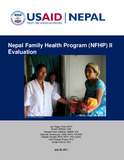Please use this identifier to cite or link to this item:
https://hdl.handle.net/20.500.14356/815| Title: | Nepal Family Health Program (NFHP) II Evaluation |
| Authors: | Riggs-Perla, Joy Adhikari, Murari Adhikari, Ramesh Kant Armbruster, Deborah Paudel, Deepak Prasai, Devi Prasad Pokhrel, Sudip |
| Issue Date: | 29-Jul-2011 |
| Keywords: | Family Health |
| Abstract: | In June of 2011, USAID/Nepal commissioned an external evaluation of the Nepal Family Health Program II (NFHP II) to assess progress, identify challenges and make recommendations for any changes needed during the final year of program implementation. The rationale for the evaluation was also to learn lessons from NFHP II in order to inform the development of a new program to begin as NFHP II is phasing out in 2012. The evaluation team, consisting of seven experts from Nepal and the U.S., reviewed documents, interviewed a wide range of stakeholders at the national, regional, district and facility levels, traveled to view programs in six of the 22 NFHP II core program districts and reviewed data from national surveys and the project’s monitoring and evaluation reports. Because NFHP II builds on the work of a previous program (NFHP I), which spanned the period from 2002-2007, the evaluation team did its best to distinguish and assess the progress since the current NFHP II began in late 2007. NFHP II was designed as a health systems strengthening program but with the greatest emphasis on strengthening the health service delivery aspects of the Ministry of Health and Population (MoHP) system. The program is based on the goals and objectives of the MoHP’s Nepal Health Sector Programme (NHSP II) strategic plan for the period 2010-2015 and works entirely by supporting the staff and various government programs at the national, district, facility and community levels. The services targeted are family planning and maternal, neonatal, and child health, with most of the emphasis on community level programs to achieve the greatest impact. NFHP II was also built on the success of NFHP I by continuing to generate evidence at the field level to support the scale up of new approaches to reducing maternal, neonatal and child mortality and expanding the use of family planning and reproductive health services, and by placing a strong emphasis on ensuring the availability of essential drugs and commodities at the community and health facility levels. This evaluation looked at the progress made during the past four years, examined the challenges and issues facing the program and recommended actions that will help maximize the program’s contribution, keeping in mind that it has only another year of implementation. It also provides some general guidance to USAID on approaches to consider for a follow on program in similar areas of work. |
| URI: | http://103.69.126.140:8080/handle/20.500.14356/815 |
| Appears in Collections: | Post Graduate Grant (PG) Reports |
Items in DSpace are protected by copyright, with all rights reserved, unless otherwise indicated.

